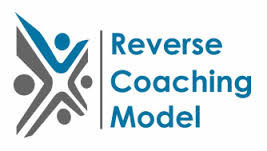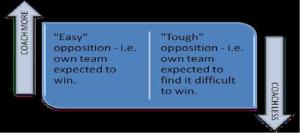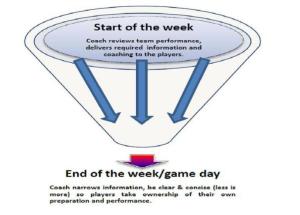Coach Article - Reverse Coaching by Wayne Goldsmith
The following article featured in the Netball New Zealand CoachForce Newsletter - October 2012
If you wish to view the original online version follow this link: http://www.mynetball.co.nz/images/stories/documents/community-netball/coaching/coachforce-newsletters/2012-oct.pdf
REVERSE COACHING
UNDER COACHING, OVER COACHING, AND HOW TO TELL THE DIFFERENCE
Part one—Over Coaching By Wayne Goldsmith
"If every instinct you have is wrong, then the opposite would have to be right."
Jerry, to George, in "The Opposite"
Coaches love to talk.
It is the time they feel most valuable to their athletes, when they are imparting knowledge and information which they believe will help the athletes to enhance their preparation and performance. If coaching was only about talking, we’d have the best athletes in the world being coached by radio program personalities and call-centre operators. Coaching is about people – about the subtleties of understanding people and helping people to realise their full potential.
The art of coaching is more than just knowing what to say. A coach must also know when to say it and how to say it, so that it has the greatest impact. A common coaching mistake is to talk and coach more as the athletes get closer to competition. For example, a football coach may talk far more on a Thursday and Friday than they do on a Monday and Tuesday to make sure they have covered every possible aspect of the game before kick-off.
Another very common coaching mistake is for coaches to talk more when the situation seems larger and more important. Typically this means that coaches will talk a lot more and coach more enthusiastically before their team faces one of the best opposition teams in the competition.
In reality, effective coaching is doing the exact opposite….Reverse Coaching.
Under-coaching and over-coaching – Reverse coaching
The five laws of Reverse coaching are:
1. Under-coach as you get closer to the competition, e.g. under-coach on game day;
2. Under-coach when the competition is more important or when the competition is more challenging, e.g. under-coach during the finals series;
3. Over-coach the further you are away from the competition, e.g. over-coach during the pre-season;
4. Over-coach when the competition is less important or when the competition is less challenging, e.g. over-coach when you are playing teams ranked lower than you in the competition;
5. Be smart enough to know the difference between times when you need to under-coach and times when you need to over-coach.
Diagram: The over-coaching / under-coaching concept. When facing an opposition that is considered “easy” and your own team is expected to win, often it is your coaching which can be the difference between success and failure. This is due to the tendency for athletes to relax and not fully focus on their preparation in the same way that they may do when facing a “tough” team. Conversely, when you are playing against a “tough” team and the competition will be more challenging, athletes will usually rise to the challenge, know what’s expected of them and willingly take ownership of their own preparation and performance.
Over-coaching:
There are many problems associated with over-coaching at the wrong time.
Here are just ten:
1. All sports require athletes to take responsibility for decision making and problem solving in competition. A coach who is over-coaching, i.e. who has not allowed athletes to learn how to make decisions in training, is setting them up to fail in competition.
2. All sports require athletes to drive their own performance in competition. A coach who does not allow athletes to take responsibility for their own performance in training has not prepared them to win in competition.
3. Over-coaching assumes the athletes cannot contribute anything to the performance. In reality most of what coaches learn comes from working with, listening to and observing athletes – i.e. from coaching.
4. Over-coaching says "This is my team, my performance". Most successful teams create “performance-partnerships” where the coach leads but the athletes drive the performance - ownership of and responsibility for the performance is shared.
5. Giving too much information at inappropriate times can confuse athletes causing them to make errors and bad decisions. Over-coaching means giving athletes too much information or giving it to them in the wrong format. Over-coaching can also be giving information at the wrong time, for example giving athletes new information (information not previously learnt or practiced) during warm-up on game day.
6. Coaching is about creating independent athletes. Over-coaching creates a dependent athlete who relies on the coach for decision making and problem solving which is performance suicide.
7. Over-coaching stifles creativity and on field genius. Quality coaching should provide the opportunity for creativity and genius to be expressed through great performances. Over-coaching places limits and controls on talented athletes – the “game-breakers” – as it restricts their capacity to be unique, different and individual.
8. Over-coaching frustrates the athletes, assistant coaches and staff etc. Everyone in the performance team can contribute to the success of the group if given the right opportunity. Over-coaching creates a micro-management environment where athletes, other coaches and staff become reluctant to give their best – they become compliance focused rather than performance orientated.
9. Over-coaching can create added performance anxiety and pressure - particularly when the over-coaching comes in the final few days before a big competition. Coach less as the competition gets closer.
10. Over coaching can send negative messages to the athletes of "panic", such as "We have not done the preparation we needed to do to be successful so I am going to keep coaching until the last minute". Athletes want to see coaches who are calm, clear, certain, confident and composed as the competition becomes closer.
Avoiding Over-coaching:
There is a way to avoid the panic and pitfalls of over-coaching…..preparation.
Coaches who over-coach tend to mismanage the “rhythm” of their preparation. That is, they feel the need to over-coach because they have not systematically and methodically delivered their coaching messages at the right time or in the right way leading into the targeted competition.
Real life coaching experience:
A professional football team I was working with asked me to look at their over-coaching problem. The coaches – and the players – noticed that game day was always a scramble and that the coaches seemed to rush around, talking to players, giving players, staff and each other lots of instructions and generally creating chaos and panic throughout the team.
I worked with them for a week and noticed that after playing on the Saturday afternoon, they all took Sunday off.
On Monday morning, the coaches met for coffee and a casual debrief about the last game. On Monday afternoon the coaches went to lunch and then came back two hours later to commence formally reviewing the last game.
On Tuesday morning, the coaches met together and discussed what they had learnt from their game reviews.
Tuesday afternoon, the coaches met individually with the players they were responsible for and debriefed them about their own personal performances during the last game. The players then completed a light general skills training session on Tuesday afternoon.
On Wednesday, the coaches met early to select the team for the next weekend’s game and finalised the team Wednesday mid-afternoon. The players then came together for a training session with a focus on defeating this week’s opposition.
On Thursday, all players and coaches took the day off.
On Friday, the coaches came together for long meetings talking about all the things that needed to be included in the final training session for the week, the pre-game player briefings, the pre-match talk etc. The day before the next game was the longest, most challenging and most demanding of the week with coaches and players at the Club for over 10 hours.
I suggested the reason for the over-coaching on game day was that no quality coaching had been done on Sunday, Monday or Tuesday. As a result the coaches ran out of time to deliver the messages and make the changes they needed to make to prepare the players appropriately for this week’s game.
Also, there was no time to step back and progressively hand over ownership of the game to the players. The coaches had to continue to drive all aspects of the game preparation right up until the whistle blew. They did everything except actually get out there and play the game!
As a result, we changed the “rhythm” of the coaching week. Coaches reviewed the previous game by themselves on Sunday and came to the coffee meeting on Monday morning with their review already completed and solutions ready to present to the coaching and player group. By Monday afternoon the coaches and players were already preparing for their next challenge. By Wednesday, the coaches were noticeably stepping back and allowing the players to take ownership of their own preparation and performance.
Over-coaching was a thing of the past and the game day coaching environment was calm, clear, certain, confident and composed. (An easy way to remember this example is by thinking of a funnel)
Summary:
1. Under-coach when everything screams at you to over-coach. The bigger the occasion, the more important the situation, the less you should coach. When the important moments arrive, the athletes know what’s expected and the last thing they need is an erratic, overly emotional, stressed out coach telling them what to do - they need you to be calm, clear, certain, confident and composed;
2. Over-coach when the occasion seems unimportant and there is an expectation of success. It is at these times that the athletes need you to be fired, focused and fantastic;
3. There is a reason coaches were given two ears, two eyes, a huge brain and only one mouth…..listen, observe, think – then talk. When you do talk, practice less is more, i.e. how can I make the maximum possible impact with the least amount of talking?
The above article featured in the Netball New Zealand CoachForce Newsletter - October 2012
If you wish to view the original online version follow this link: http://www.mynetball.co.nz/images/stories/documents/community-netball/coaching/coachforce-newsletters/2012-oct.pdf












Comments
Comment Guidelines: The SportsTG Network is made up of players, families and passionate sports followers like you who have a strong opinion about sport. That's great - we want you to have your say and share your thoughts with the world. However, we have a few rules that you must follow to keep it fun for all. Please don't be rude, abusive, swear or vilify others. Apart from some pretty serious sport sanctions, we also can ban you and report you if things get out of hand. So play fair and have fun, and thanks for your contribution.